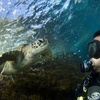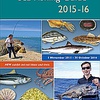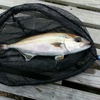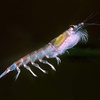
QLD study: Marine species will battle for survival as climate changes
Warming seas and the migration of species will change the marine environment on our doorstep, according to Queensland researchers. Read more in the Sunshine Coast Daily.



Warming seas and the migration of species will change the marine environment on our doorstep, according to Queensland researchers. Read more in the Sunshine Coast Daily.

Watch this video of science in action at the Institute for Marine and Antarctic Studies (IMAS) (which is part of the University of Tasmania).

The 2015-16 Recreational Sea Fishing Guide is out now. Pick up a copy now from Service Tasmania shops, tackle shops or read it online.

An Amberjack (Seriolal dumerili) was recently caught by Ron Walker in Ansons Bay, Tasmania. As far as we can tell this is the southernmost sighting of this species in Australia! Check out the sighting here.

A new study by University of Tasmania researchers and international collaborators has found that a key element of future changes in the distribution of marine biodiversity resulting from ocean warming is not as closely related to local warming rates as previously assumed. Read more in the University of Tasmania News.

Hundreds of divers and snorkelers will hit the water in their metaphorical lab coats this summer as part of the biggest citizen science event on Victoria’s marine calendar, the Great Victorian Fish Count. Read more about this event that runs from November 21 to Dec 6 in the Mornington Peninsula News (Redmap gets a mention too!).

The world’s oceans are warming at an accelerated rate due to anthropogenic activities. Over 100 species have undertaken polewards range-shifts along the south-east coast of Australia with expected positive and negative impacts in the invaded southern communities. Read more about this hot topic by researcher Jorge E. Ramos and Redmap founder Gretta Pecl from the Institute for Marine and Antarctic Studies in the Ecological Society of Australia's Hot Topics …

Fancy yourself a bit of an artist? Check out the latest Redmap marine design competition.... (Closes November 5th 2015)

One of Australia’s key research focuses is the impact climate change is having on the cornerstone of the Antarctic marine ecosystem — krill. They are the world’s most abundant crustacean and form the staple diet of many animals, including seals, whales, fish, squid, penguins and other seabirds. Any threat to krill is a threat to the entire marine system. Read the full article at The Mercury.

A University of Queensland scientist is calling for volunteer divers to photograph the underside of manta rays in waters off the Western Australian coastline and upload them to Facebook as part of a research project. Read more at UQ News.